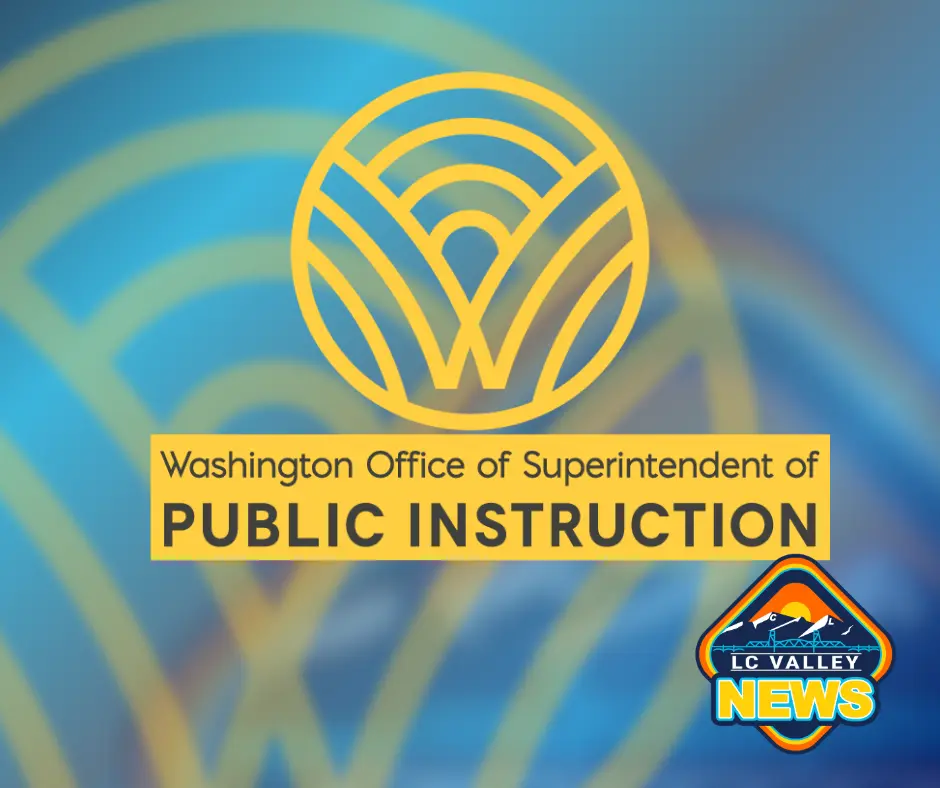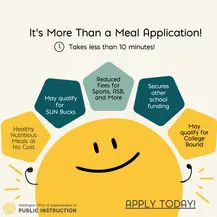
Families are encouraged to provide income information to their local school to ensure that their students have access to much-needed school meals.
Households are encouraged to submit the Child Nutrition Eligibility and Education Benefit (CNEEB) Application through their local school district. Through submission of the CNEEB Application, households may qualify for:
- Free and reduced-price meal benefits,
- Summer EBT (SUN Bucks) benefits (if enrolled in a NSLP/SBP school),
- Reduced fees for other programs and activities, and/or
- Help secure additional funding for their school district.
The form is simple to fill out and confidential. There are no citizenship requirements for participation in the federal child nutrition programs that Washington’s schools operate, and immigration status is not requested or disclosed.
All households with students in grades K–12 receive application packets from their child’s school at the beginning of the school year. These packets provide instructions and directions on where to send the materials. In addition, many schools make CNEEB applications available electronically.
After families submit their CNEEB Applications, determinations are made within 10 operating days of receipt. Households denied eligibility can appeal the decision by contacting their school.
Community Eligibility Provision (CEP) and Provision 2 schools provide meals at no cost for all students in a school, but CNEEB Applications provide crucial eligibility information for other student benefits.
CNEEB Applications can be submitted at any time during the school year. Households that experience a change in income due to job loss or other circumstances are encouraged to apply.
Family income information supports the continued operation of meal programs in Washington state. In Washington, the Office of Superintendent of Public Instruction (OSPI) administers federal U.S. Department of Agriculture (USDA) Child Nutrition Programs, including, the National School Lunch Program, School Breakfast Program, and Special Milk Program.
USDA Child Nutrition Program Income Guidelines
Income eligibility guidelines are used to determine eligibility to receive free or reduced-price meals or free milk.
The following income guidelines for eligibility for free meals and reduced-price meals apply from July 1, 2025, through June 30, 2026.
Free Meals
| Household Size | Annual | Monthly | Twice Per Month | Every Two Weeks | Weekly |
| 1 | $20,345 | $1,696 | $848 | $783 | $392 |
| 2 | $27,495 | $2,292 | $1,146 | $1,058 | $529 |
| 3 | $34,645 | $2,888 | $1,444 | $1,333 | $667 |
| 4 | $41,795 | $3,483 | $1,742 | $1,608 | $804 |
| 5 | $48,945 | $4,079 | $2,040 | $1,883 | $942 |
| 6 | $56,095 | $4,675 | $2,338 | $2,158 | $1,079 |
| 7 | $63,245 | $5,271 | $2,636 | $2,433 | $1,217 |
| 8 | $70,395 | $5,867 | $2,934 | $2,708 | $1,354 |
| For each additional family member, add: | $7,150 | $596 | $298 | $275 | $138 |
Reduced-Price Meals
NOTE: The State of Washington pays the copay for public school students who are eligible for reduced-price meals in grades pre-K–12.
| Household Size | Annual | Monthly | Twice Per Month | Every Two Weeks | Weekly |
| 1 | $28,953 | $2,413 | $1,207 | $1,114 | $557 |
| 2 | $39,128 | $3,261 | $1,631 | $1,505 | $753 |
| 3 | $49,303 | $4,109 | $2,055 | $1,897 | $949 |
| 4 | $59,478 | $4,957 | $2,479 | $2,288 | $1,144 |
| 5 | $69,653 | $5,805 | $2,903 | $2,679 | $1,340 |
| 6 | $79,828 | $6,653 | $3,327 | $3,071 | $1,536 |
| 7 | $90,003 | $7,501 | $3,751 | $3,462 | $1,731 |
| 8 | $100,178 | $8,349 | $4,175 | $3,853 | $1,927 |
| For each additional family member, add: | $10,175 | $848 | $424 | $392 | $196 |
Additional Eligibility
There are several additional programs and circumstances that provide automatic eligibility for free and reduced-price meals.
To facilitate automatic eligibility and make the process more efficient for families, the Department of Social and Health Services (DSHS) provides a list of children who receive the following services. Households are notified of the eligibility and must contact the school if they choose to decline the benefits.
- Temporary Assistance for Needy Families (TANF)
- Supplemental Nutrition Assistance Program/Basic Food (SNAP)
- Specific Medicaid programs
- Children placed in foster care
In foster households, all other students in the household may be eligible based on household size and income. In these situations, households may submit a CNEEB Application.
Students in the following programs or circumstances are also eligible for free and reduced-price meals. Families should contact their school for more information.
- Students experiencing homelessness
- Students enrolled in Migrant Education Programs
- Households taking part in the Food Distribution Program on Indian Reservations
- Students in Head Start and Early Childhood Education and Assistance Program (ECEAP)
Eligibility lasts from the date of approval through the first 30 operating days of the next school year or until a new eligibility determination is made, whichever comes first.
Households needing assistance with application materials in languages other than English should contact their school for assistance.
If you have questions about eligibility, please contact your child’s school.

